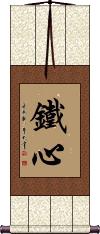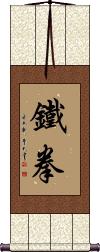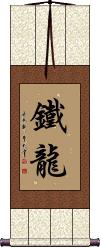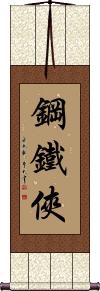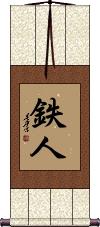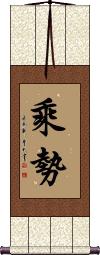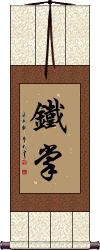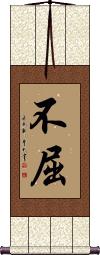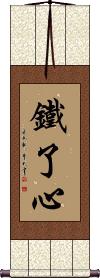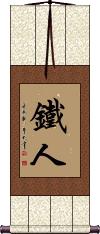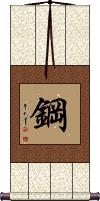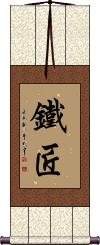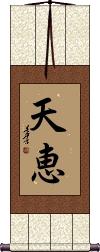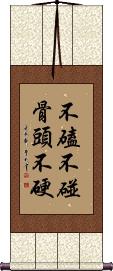Many custom options...
And formats...

Will of Iron in Chinese / Japanese...
Buy a Will of Iron calligraphy wall scroll here!
Personalize your custom “Will of Iron” project by clicking the button next to your favorite “Will of Iron” title below...
2. Iron Heart
3. Iron Fist
4. Iron Dragon
5. Iron Man
6. Even an iron bar can be ground to a needle
7. Iron Man
8. Strike While the Iron is Hot
9. Iron Palm
11. Indomitable / Persistence / Fortitude
16. Steel
17. Blacksmith
19. Genghis Khan
Stay Strong / Iron Will
鉄心石腸 is a Japanese proverb that suggests you should have the inner-strength and will as hard and steadfast as iron.
It's the Japanese way of saying, “stay strong.” This is an especially uplifting thing to say to a person in distress or recovering from a disaster. It's kind of the survivor's creed.
If you literally translate this, it means “iron will, stone guts” or “iron heart, rock-hard bowels.”
Iron Heart
鐵心 can be translated as “iron heart,” “steel core,” or “iron mind” in Chinese and Japanese Kanji.
This is not a common term, but I added it here since so many were looking for “iron heart.” This is almost like saying you are without emotions or feelings - a very stoic person. This is not a Buddhist trait.
Iron Fist
Tie Quan / Tieh Chuan
鐵拳 is a common theme used by various schools of martial arts.
鐵 means “iron” but, in some cases, can mean “indisputable.”
拳 means fist.
Some schools use the older/Taiwanese way to Romanize the iron fist, so you may have seen it spelled “Tieh Chuan” instead of “Tie Quan.” Neither way is technically incorrect.
Note that in Mandarin, the first part of the first character sounds like the English word “tea,” blending into a soft “-eh” sound. The second character sounds a lot like “chew on” but as if it is one syllable.
![]() After WWII in Japan, the Kanji for iron was simplified. This new Kanji form is shown to the right. If you want this modern Japanese version, please click on the Kanji to the right, instead of the button above. The characters shown to the left would still be considered the old or ancient Japanese version of this title.
After WWII in Japan, the Kanji for iron was simplified. This new Kanji form is shown to the right. If you want this modern Japanese version, please click on the Kanji to the right, instead of the button above. The characters shown to the left would still be considered the old or ancient Japanese version of this title.
Iron Dragon
Iron Man
Even an iron bar can be ground to a needle
Iron Man
Strike While the Iron is Hot
Iron Palm
鐵掌 means “iron palm,” the martial arts technique taught by Brian Gray and others.
This term can mean different things to different people. The consensus is that rather than a type or style of martial arts, this is a technique for refining hand position and strengthening hands to strike blows with maximum force and effect.
The regime may include herbal treatments and special exercises to fortify the hands.
In more extreme versions, the carpals and metacarpal bones in the hand are systematically broken so that when they heal, they will become stronger.
Japanese note: This does make sense in Japanese (though the version shown above is the ancient form of the first Kanji), this is far from a commonly-known term.
Indomitable Spirit
Korean Only
百折不屈 is a Korean proverb that means “indomitable spirit,” at least, that is the way it is commonly translated in martial arts circles (Taekwondo, Hapkido, etc.).
The literal translation is “[one] hundred [times] broken [still] don't succumb.”
Or more naturally translated, “Even if attacked/beaten one hundred times, still be undaunted/indomitable.”
Notes:
Some will say this is one long word rather than a proverb.
This is also a proverb/word in Chinese though rarely used in modern times.
Indomitable / Persistence / Fortitude
不屈 is the short form of a longer Chinese word and also a word used in Korean and Japanese to express the idea of being indomitable. It literally means “will not bend,” “will not crouch,” “will not yield,” “will not flinch,” or “will not submit.”
Note: Some will translate this as “indomitable spirit”; however, technically, there is no character to suggest the idea of “spirit” in this word.
Indomitable Spirit
Indomitable / Unyielding
不屈不撓 means “Indomitable” or “Unyielding.”
不屈不撓 is a long word by Chinese standards. At least, it is often translated as a single word into English. It's actually a proverb in Chinese.
If you want to break it down, you can see that the first and third characters are the same. Both mean “not” (they work as a suffix to make a negative or opposite meaning to whatever character follows).
The second character means “bendable.”
The last means “scratched” or “bothered.”
So this really means “Won't be bent, can't be bothered.” I have also seen it written as “Will not crouch, will not submit.” This comes from the fact that the second character can mean “to crouch” and the last can mean “to submit” (as in “to give in” such as “submitting to the rule of someone else”). This may explain better why these four characters mean “indomitable.”
Notes:
Some will translate this as “indomitable spirit”; however, technically, there is no character to suggest the idea of “spirit” in this word.
Other translations include indefatigability, indomitableness, or unremitting tenacity.
The first two characters can be stand-alone words in Chinese.
In Japanese, this is considered two words (with very similar meanings). It's more common to see the word order flipped to 不撓不屈 in Japanese.
The same characters are used in old Korean Hanja. Just like in Japanese, the words are swapped to 不撓不屈 creating a word pronounced “불요불굴” in Korean.
See 不撓不屈
Unshakable / Determined
Ironman Triathlon Event
Steel
鋼 is the Chinese character and Japanese Kanji for steel (as in iron mixed with carbon and other elements to make it stronger).
This can also be the name Hagane in Japanese. Like Mr. Steel in English. It can also be pronounced as Tsuyoshi or Kou when used as a personal or given name in Japan.
Blacksmith
Blessed by Heaven
天恵 means “Heaven's Blessing,” “Blessings from Heaven,” or “Blessed by Heaven” in Japanese Kanji.
Depending on the context in which this is used, it can also mean “gift of nature,” or even “natural resources” (as in Heaven or God bestowed things like oil, iron, gold, and other natural resources upon mankind).
Genghis Khan
成吉思汗 is the full title for Genghis Khan (1162-1227).
Khan is the title of his position as emperor. Genghis is his name.
In Japan, this also means Genghis Khan but is sometimes used to refer to a specific Japanese mutton and vegetable dish or the slotted dome cast iron grill for preparing this dish.
Strong bones come from hard knocks
不磕不碰骨頭不硬 is a Chinese proverb that literally translates as: Without being knocked around a bit, [one's] bones won't become hard.
Figuratively, this means: One can't become strong without first being tempered by “hard knocks.”
While true for everyone, this sounds like the “Iron Body” form of Kung Fu, where practitioners' bodies are beaten (and often bone fractured) in order to become stronger.
For the rest of us, this is just about how we can be tempered and build character through the hardships in our lives.
This is not a common title for a wall scroll in China.
This in-stock artwork might be what you are looking for, and ships right away...
The following table may be helpful for those studying Chinese or Japanese...
| Title | Characters | Romaji (Romanized Japanese) | Various forms of Romanized Chinese | |
| Stay Strong Iron Will | 鉄心石腸 | tesshin sekichou tesshinsekichou teshin sekicho | ||
| Iron Heart | 鐵心 铁心 | tetsu kokoro / tesshin tetsukokoro / tesshin tetsu kokoro / teshin | tiě xīn / tie3 xin1 / tie xin / tiexin | t`ieh hsin / tiehhsin / tieh hsin |
| Iron Fist | 鐵拳 铁拳 / 鉄拳 | tekken / teken | tiě quán / tie3 quan2 / tie quan / tiequan | t`ieh ch`üan / tiehchüan / tieh chüan |
| Iron Dragon | 鐵龍 铁龙 | tiě lóng / tie3 long2 / tie long / tielong | t`ieh lung / tiehlung / tieh lung | |
| Iron Man | 鋼鐵俠 | gāng tiě xiá gang1 tie3 xia2 gang tie xia gangtiexia | kang t`ieh hsia kangtiehhsia kang tieh hsia |
|
| Even an iron bar can be ground to a needle | 磨杵成針 磨杵成针 | mó chǔ chéng zhēn mo2 chu3 cheng2 zhen1 mo chu cheng zhen mochuchengzhen | mo ch`u ch`eng chen mochuchengchen mo chu cheng chen |
|
| Iron Man | 鉄人 | tetsujin | ||
| Strike While the Iron is Hot | 乘勢 乘势 | chéng shì cheng2 shi4 cheng shi chengshi | ch`eng shih chengshih cheng shih |
|
| Iron Palm | 鐵掌 铁掌 | tetsu-tenohira | tiě zhǎng tie3 zhang3 tie zhang tiezhang | t`ieh chang tiehchang tieh chang |
| Indomitable Spirit | 百折不屈 | bǎi shé bù qū bai3 she2 bu4 qu1 bai she bu qu baishebuqu | pai she pu ch`ü paishepuchü pai she pu chü |
|
| Indomitable Persistence Fortitude | 不屈 | fukutsu | bù qū / bu4 qu1 / bu qu / buqu | pu ch`ü / puchü / pu chü |
| Indomitable Spirit | 負けじ魂 | ma ke ji damashii makejidamashii ma ke ji damashi | ||
| Indomitable Unyielding | 不屈不撓 不屈不挠 | fu kutsu fu tou fukutsufutou fu kutsu fu to | bù qū bù náo bu4 qu1 bu4 nao2 bu qu bu nao buqubunao | pu ch`ü pu nao puchüpunao pu chü pu nao |
| Unshakable Determined | 鐵了心 铁了心 | tiě le xīn tie3 le5 xin1 tie le xin tielexin | t`ieh le hsin tiehlehsin tieh le hsin |
|
| Ironman Triathlon Event | 鐵人 铁人 | tetsu jin / tetsujin | tiě rén / tie3 ren2 / tie ren / tieren | t`ieh jen / tiehjen / tieh jen |
| Steel | 鋼 钢 | hagane | gāng / gang1 / gang | kang |
| Blacksmith | 鐵匠 铁匠 | tiě jiang tie3 jiang5 tie jiang tiejiang | t`ieh chiang tiehchiang tieh chiang |
|
| Blessed by Heaven | 天恵 | ten kei / tenkei | ||
| Genghis Khan | 成吉思汗 | jin gi su kan jingisukan | chéng jí sī hán cheng2 ji2 si1 han2 cheng ji si han chengjisihan | ch`eng chi ssu han chengchissuhan cheng chi ssu han |
| Strong bones come from hard knocks | 不磕不碰骨頭不硬 不磕不碰骨头不硬 | bù kē bù pèng gǔ tóu bù yìng bu4 ke1 bu4 peng4 gu3 tou2 bu4 ying4 bu ke bu peng gu tou bu ying bukebupenggutoubuying | pu k`o pu p`eng ku t`ou pu ying pukopupengkutoupuying pu ko pu peng ku tou pu ying |
|
| In some entries above you will see that characters have different versions above and below a line. In these cases, the characters above the line are Traditional Chinese, while the ones below are Simplified Chinese. | ||||
Successful Chinese Character and Japanese Kanji calligraphy searches within the last few hours...

